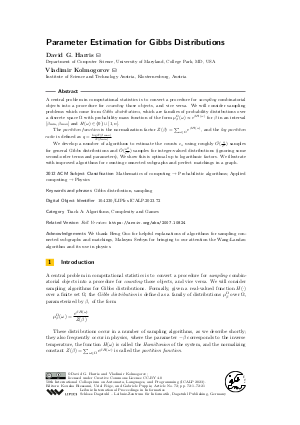Parameter Estimation for Gibbs Distributions
Authors David G. Harris, Vladimir Kolmogorov
-
Part of:
Volume:
50th International Colloquium on Automata, Languages, and Programming (ICALP 2023)
Part of: Series: Leibniz International Proceedings in Informatics (LIPIcs)
Part of: Conference: International Colloquium on Automata, Languages, and Programming (ICALP) - License:
 Creative Commons Attribution 4.0 International license
Creative Commons Attribution 4.0 International license
- Publication Date: 2023-07-05
File

PDF
LIPIcs.ICALP.2023.72.pdf
- Filesize: 0.87 MB
- 21 pages
Document Identifiers
Related Versions
- Full Version https://arxiv.org/abs/2007.10824
Subject Classification
ACM Subject Classification
- Mathematics of computing → Probabilistic algorithms
- Applied computing → Physics
Keywords
- Gibbs distribution
- sampling
Metrics
- Access Statistics
-
Total Accesses (updated on a weekly basis)
0Document
0Metadata
Abstract
A central problem in computational statistics is to convert a procedure for sampling combinatorial objects into a procedure for counting those objects, and vice versa. We will consider sampling problems which come from Gibbs distributions, which are families of probability distributions over a discrete space Ω with probability mass function of the form μ^Ω_β(ω) ∝ e^{β H(ω)} for β in an interval [β_min, β_max] and H(ω) ∈ {0} ∪ [1, n].
The partition function is the normalization factor Z(β) = ∑_{ω ∈ Ω} e^{β H(ω)}, and the log partition ratio is defined as q = (log Z(β_max))/Z(β_min)
We develop a number of algorithms to estimate the counts c_x using roughly Õ(q/ε²) samples for general Gibbs distributions and Õ(n²/ε²) samples for integer-valued distributions (ignoring some second-order terms and parameters), We show this is optimal up to logarithmic factors. We illustrate with improved algorithms for counting connected subgraphs and perfect matchings in a graph.
Cite As Get BibTex
David G. Harris and Vladimir Kolmogorov. Parameter Estimation for Gibbs Distributions. In 50th International Colloquium on Automata, Languages, and Programming (ICALP 2023). Leibniz International Proceedings in Informatics (LIPIcs), Volume 261, pp. 72:1-72:21, Schloss Dagstuhl – Leibniz-Zentrum für Informatik (2023)
https://doi.org/10.4230/LIPIcs.ICALP.2023.72
BibTex
@InProceedings{harris_et_al:LIPIcs.ICALP.2023.72,
author = {Harris, David G. and Kolmogorov, Vladimir},
title = {{Parameter Estimation for Gibbs Distributions}},
booktitle = {50th International Colloquium on Automata, Languages, and Programming (ICALP 2023)},
pages = {72:1--72:21},
series = {Leibniz International Proceedings in Informatics (LIPIcs)},
ISBN = {978-3-95977-278-5},
ISSN = {1868-8969},
year = {2023},
volume = {261},
editor = {Etessami, Kousha and Feige, Uriel and Puppis, Gabriele},
publisher = {Schloss Dagstuhl -- Leibniz-Zentrum f{\"u}r Informatik},
address = {Dagstuhl, Germany},
URL = {https://drops.dagstuhl.de/entities/document/10.4230/LIPIcs.ICALP.2023.72},
URN = {urn:nbn:de:0030-drops-181246},
doi = {10.4230/LIPIcs.ICALP.2023.72},
annote = {Keywords: Gibbs distribution, sampling}
}
Author Details
Acknowledgements
We thank Heng Guo for helpful explanations of algorithms for sampling connected subgraphs and matchings, Maksym Serbyn for bringing to our attention the Wang-Landau algorithm and its use in physics.
References
-
K. Adiprasito, J. Huh, and E. Katz. Hodge theory for combinatorial geometries. Annals of Mathematics, 188(2):381-452, 2018.

-
N. Anari, K. Liu, S. O. Gharan, and C. Vinzant. Log-concave polynomials II: High-dimensional walks and an FPRAS for counting bases of a matroid. In Proc. 51st annual ACM Symposium on Theory of Computing (STOC), pages 1-12, 2019.

-
R. E. Belardinelli and V. D. Pereyra. Wang-Landau algorithm: A theoretical analysis of the saturation of the error. The Journal of Chemical Physics, 127(18):184105, 2007.

-
I. Bezáková, D. Štefankovič, V. V. Vazirani, and E. Vigoda. Accelerating simulated annealing for the permanent and combinatorial counting problems. SIAM J. Comput., 37:1429-1454, 2008.

-
Charlie Carlson, Ewan Davies, Alexandra Kolla, and Will Perkins. Computational thresholds for the fixed-magnetization ising model. In Proc. 54th annual ACM Symposium on Theory of Computing (STOC), pages 1459-1472, 2022.

-
Zongchen Chen, Kuikui Liu, and Eric Vigoda. Optimal mixing of Glauber dynamics: Entropy factorization via high-dimensional expansion. In Proc. 53rd annual ACM Symposium on Theory of Computing (STOC), pages 1537-1550, 2021.

-
Ewan Davies and Will Perkins. Approximately counting independent sets of a given size in bounded-degree graphs. In Proc. 48th International Colloquium on Automata, Languages, and Programming (ICALP), pages 62:1-62:18, 2021.

-
W. Feng, H. Guo, Y. Yin, and C. Zhang. Fast sampling and counting k-SAT solutions in the local lemma regime. In Proc. 52nd annual ACM Symposium on Theory of Computing (STOC), pages 854-867, 2020.

-
G. Fort, B. Jourdain, E. Kuhn, T. Leliévre, and G. Stoltz. Convergence of the Wang-Landau algorithm. Mathematics of Computation, 84(295):2297-2327, 2015.

-
H. Guo and K. He. Tight bounds for popping algorithms. Random Struct. Algorithms, 57(2):371-392, 2020.

-
H. Guo and M. Jerrum. A polynomial-time approximation algorithm for all-terminal network reliability. SIAM J. Comput., 48(3):964-978, 2019.

-
M. Huber. Approximation algorithms for the normalizing constant of Gibbs distributions. The Annals of Applied Probability, 25(2):974-985, 2015.

-
Vishesh Jain, Will Perkins, Ashwin Sah, and Mehtaab Sawhney. Approximate counting and sampling via local central limit theorems. In Proc. 54th annual ACM Symposium on Theory of Computing (STOC), pages 1473-1486, 2022.

-
M. Jerrum and A. Sinclair. Approximating the permanent. SIAM J. Comput., 18(6):1149-1178, 1989.

-
M. Jerrum and A. Sinclair. The Markov Chain Monte Carlo method: an approach to approximate counting and integration. Approximation algorithms for NP-hard problems, pages 482-520, 1996.

-
V. Kolmogorov. A faster approximation algorithm for the Gibbs partition function. Proceedings of Machine Learning Research, 75:228-249, 2018.

-
Pedro Ojeda, Martin E Garcia, Aurora Londoño, and Nan-Yow Chen. Monte Carlo simulations of proteins in cages: influence of confinement on the stability of intermediate states. Biophysical journal, 96(3):1076-1082, 2009.

-
L. N. Shchur. On properties of the Wang-Landau algorithm. Journal of Physics: Conference Series, 1252, 2019.

-
D. Štefankovič, S. Vempala, and E. Vigoda. Adaptive simulated annealing: A near-optimal connection between sampling and counting. J. of the ACM, 56(3) Article #18, 2009.

-
F. Wang and D. P. Landau. Efficient, multiple-range random walk algorithm to calculate the density of states. Phys. Rev. Lett., 86(10):2050-2053, 2001.

